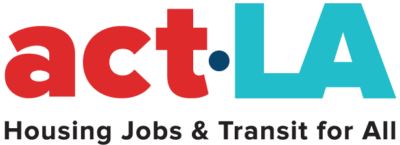ACT-LA’s Affordability Proposal and Summary of Concerns with SB 50 | March 18, 2019
ACT-LA submitted the following proposal on affordability contributions for SB 50 to Senator Scott Wiener in February 2019. Link to proposal and fact sheet here. We outline our equity principles and where SB 50 falls short here.
Equity Groups Submit Letter Expressing Serious Concerns with Wiener’s SB 50 | March 27, 2019
On March 27th 2019, a letter signed by 35 organizations across California was submitted to Senator Scott Wiener, author of SB 50, expressing significant concerns with the current version of SB 50. The letter lays out concerns that fall into 3 broad categories: affordable housing requirements, protections for sensitive communities, and preservation of local affordable housing policies and plans. It also provides amendments to the bill in order to address these concerns. Since March 27th, 20 more equity organizations have signed onto the letter.
Update on SB 50 Negotiations | April 29, 2019
ACT-LA, along with our state equity partners, have continued to work with the author and sponsors of SB 50 to address our concerns with the bill. To learn about updates on the status of SB 50 negotiations, read our statement and affordability proposal below with details on where we have made progress and where we continue to have concerns.
- SB 50 Affordable Housing & Sensitive Communities Demands – January 2020
- SB 50 New Affordable Housing Proposal – May 2019
- Update on SB 50 – April 2019
- Sen. Weiner Policy Update to ACT-LA – April 2019
- SB 50 Concerns Group Sign on Letter – March 2019
SB 50 Update: Read Housing equity groups’ Oppose Unless Amended letter to Senator Wiener | January 22, 2020
After over a year of negotiations with SB 50 author and co-sponsors, ACT-LA along with 27 equity organizations have submitted a letter opposing SB 50 unless amended. Read our letter here for details.
Statement from Equity Advocates on SB 50 | January 30, 2020
Reacting to the failure of SB 50 to move out of the Senate, the groups Alliance for Community Transit-Los Angeles (ACT-LA), Public Counsel, PolicyLink, Western Center on Law and Poverty, Public Advocates, and the California Rural Legal Assistance Foundation made the following statement:
It is time to reject false choices and get serious about affordable housing and community stability.
The debate around SB 50, and SB 827 before it, has too often been reduced to a false choice: protect the status quo of exclusionary zoning or embrace a trickle-down market-based model. While this simple NIMBY-YIMBY binary fuels online arguments and frames the public narrative, millions of Californians continue to suffer without appropriate solutions. We reject the status quo, but we also reject the notion that the low-income communities and communities of color most harmed by the planning and zoning decisions of the past should be forced to accept new policies that fall short of true equity and inclusion.
Last week, a group of 28 community-based and statewide organizations that have been in negotiations with the author and sponsors of SB 50 took an “oppose unless amended” position on the bill. We took this position only after 15 months of discussion to resolve our concerns. The issues we have raised are critical to ensure that zoning reform does not make the housing crisis worse for low-income renters. Despite important improvements to the bill, SB 50 was not bold enough or targeted enough to address the affordable housing needs of low-income Californians and did not include meaningful protections for communities most sensitive to displacement.
After the final SB 50 vote, Senate President Toni Atkins rightly acknowledged that there is still much work to be done to address the housing crisis and called for substantive alternatives. Our organizations have and will continue to put forward tangible community-centered proposals for inclusive and equitable development. We have supported and sponsored legislation that breaks down barriers to new inclusive housing development in historically exclusionary neighborhoods and we have put forward thoughtful and nuanced frameworks to maximize deeply affordable housing production and protect vulnerable low-income neighborhoods. These ideas did not die with SB 50, and we remain committed to working with any elected official who is ready to do the difficult but necessary work of moving past false choices and finding real solutions.
